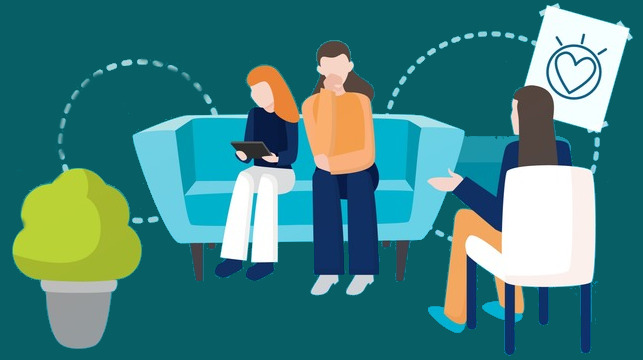Psychotherapy
Psychotherapy benefits:
- Psychotherapy allows you to express your feelings
- It helps you ease stress, anxiety, depression
- Psychotherapy gains a deeper insight into the issues you face
- It’s a complete confidential treatment, it means you can talk about things or feelings you might not feel are able to discuss with anyone else.
- A psychotherapist changes the mindset and point of view towards your sufferings
- You learn ways to talk to other people about your condition
- Psychotherapy sessions can be one on one, with partner or family member, in groups
- Open and free communication with a psychotherapist
How many sessions should I attend?
Psychotherapy sessions can be short term as well as long term. The number of attending sessions depends upon you and your “best psychotherapist near me” or local psychotherapist. The type of psychotherapy you want to get treated with is depended on the depth and complexity of the issues you are facing. Mostly, the type favours the choice of a psychotherapist.
Vital types of Psychotherapy:
Psychotherapy covers a wide range of topics, approaches and methods. The type of treatment can be individual, with a partner or family member and in groups too. Psychotherapy can also be provided for adolescents and children as well as adults.
Let’s have a look at some of the major types of psychotherapy –
Individual Psychotherapy:
As the name indicates individual psychotherapy is a form of therapy where a patient is treated one on one with the psychotherapist. Common goals of individual therapy could be adopting an inspiring change, motivation and improve quality of life. Individual psychotherapy promotes positive emotions and feelings such as compassion, self-esteem, happiness, relaxation, etc.
Individual psychotherapy is provided by trained professionals called psychologist or psychotherapist to get rid of problems or disorders a client is going through. The technique of implementing a treatment relies on the psychological problem experienced by the client, the personal beliefs and practices of the therapist and the individual needs of the client.
Individual therapy enables the therapist and client to focus on each other, working together to solve the client’s issues. It does help and creates good bonding between themselves which further converts into a good personal relationship.
Group Psychotherapy:
Group psychotherapy is exactly vice versa of individual psychotherapy. The psychotherapist conducts therapist sessions of people who prefer attending sessions in group.
In group psychotherapy various therapists gather to have conversation with small groups of clients together. Group therapy is not based on one single psychotherapeutic theory, but many and often revolves around talking, and may also include other approaches such as psychodrama, movement work, body psychotherapy or constellations work.
Group psychotherapy clearly aims to support in solving emotional fluctuations and encourage the personality development of participants in a group. The group psychotherapy is conducted through the sharing of past and current experiences, interactions with and between members. These interactions may not be only positive as the issues a client is facing in daily life, will inevitably reflect or shared amongst all the group members. However, a discussion on each issue adds valuable opportunities for such problems to be worked through in a therapeutic setting, generating experiences, which may then be translated into “real life.”
The well-trained and skilled psychotherapists will be selective in choosing members of the group to support group counselling.
Humanistic Psychotherapy:
Humanistic psychotherapy is a positive approach to psychotherapy focusing on a person’s nature instead of categorizing groups of people with similar characteristics as having the same problems. It’s the form of therapy that is not limited up to a therapist’s point of view, but an observation of own behaviour by a client is included. The therapy focuses on an individual’s positive traits, behaviour and his/her ability to use their personal instincts to find wisdom, growth, healing and fulfilment within themselves.
Both the client and the psychotherapist are actively engaged in shaping the processes of assessment, intervention and evaluation of outcomes in humanistic psychotherapy. This approach enables focusing on an individual’s abilities for self-actualisation, self-regulation, responsibility and choice. An impact of the external world upon the internal world on a client is taken into consideration to highlight the significance of social, cultural and political kingdoms of experience.
Humanistic psychotherapy benefits individuals, couples, children, families, groups and organisations.
Positive Psychotherapy:
Positive psychology is exactly opposite to the traditional psychology which focused on the causes and symptoms of telepathic illness and emotional disturbances. Positive psychology emphasizes traits, thinking patterns, behaviours and experiences that are ahead-thinking and can help improve the quality of a person’s daily life. The positive psychotherapy includes optimism, positivity, happiness, hopefulness, perseverance, justice.
It’s an exploration of the client’s strengths rather than weaknesses. Positive psychotherapy is applicable to children, adolescents, youngsters and couples via mental health facilities and private counselling practices.
The goal of positive psychotherapy is to substitute the traditional form of psychotherapy which focuses on negativity than positivity.
Holistic Psychotherapy:
Holistic psychotherapy relatively stresses the relationship between mind, body and spirit attempting to understand and address the ways issues in one aspect of a person can lead to concerns in other areas. Holistic psychotherapy approaches a patient to take care of health on its own. People opting for holistic psychotherapy promote better self-acceptance under the guidance of mental health professionals.
Holistic psychotherapy leads you to get rid of stress, depression, anxiety. It’s the natural form of treatment. Many holistic psychotherapists attempt to use the individual’s symptoms, such as depression, anxiety, or even substance abuse, as a method to foster higher awareness in the individual. Visual imagery, relaxation and other bodywork techniques are used by holistic psychotherapists to assist clients to get rid of the issues they are facing.
Depression, anxiety, mood swings, somatic ailments, stress, traumas like abuse, sexual assault are the issues and disorders one can get rid of through holistic psychotherapy.
Systematic Psychotherapy:
Systematic psychotherapy is a type of therapy that deals with the people, who are in a relationship with one another, their interacting groups, their patterns and dynamics. It has deep roots with family, family system and practical approach towards problem rather than analytical. The major role of psychotherapists in systematic psychotherapy is to acquaint innovative bumps with help the changing of the framework and address current relationship designs, as opposed to examining causes, for example, subconscious impulses or childhood trauma.
Systematic psychotherapy is useful in the fields of businesses, politics, education, psychiatry, social work, family medicine.
Psychotherapy for anxiety:
A form of psychotherapy called Cognitive Behavioural Therapy (CBT) is extremely effective to treat anxiety and its related disorders. Research clearly indicates CBT’s effectiveness in the treatment of social anxiety disorder, generalised anxiety disorder, among many other conditions.
Through CBT, psychologists help patients learn to identify and manage the factors that contribute to their anxiety. CBT identifies the viewpoint of the patient towards negative thoughts and emotions. As the name CBT indicates, it involves two components.
Cognitive examines the way negative thoughts, emotions, cognitions lead to anxiety. Behavioural examines how your behaviour and reactions in such situations that trigger anxiety.
Child Psychotherapy:
Psychotherapy alludes to an assortment of procedures and techniques used to support children and adolescents who are facing challenges with their emotions or behaviour. Child psychotherapists use language and play to watch, survey, help and treat children and youngsters who are encountering conduct, passionate, social and psychological difficulties.
Firstly, a child psychologist determines the need of child psychotherapy. This depends on a child’s current problems, history, level of development, ability to cooperate with treatment, and what interventions are most likely to help with the presenting concerns. Child psychotherapy benefits a child in various ways. Children receive emotional support, resolve conflicts with the people, understand problems and solution and find new ways and techniques to tackle the earlier issues.
The duration of psychotherapy depends on the complexity and severity of problems.
Psychoanalysis therapy:
Psychoanalysis therapy is a form of in-depth talk therapy that aims to bring unconscious or deeply buried thoughts, feelings to the conscious mind from the unconscious mind. This is done to bring into the surface and examine it. Working together, the therapist and client look and study how repressed feelings, emotions, experiences have affected a client’s thinking, behaviour in adulthood.
Regular psychotherapy sessions bring unconscious patterns into awareness with the aim of changing them. Client and therapist relation is very crucial in this therapy as it has a significant influence upon the client’s unconscious ways of behaving and, in itself, becomes a central area of focus, highlighting the client’s patterns within the relationship in the immediacy of the sessions.
How do I know which type of therapy is best for me?
You can use our Search Licensed Psychologist directory for ‘best psychotherapist near me’. You can enjoy the benefits of all specifications according to the disorders or your needs.
Related Blogs
Nutritional psychiatry: What does it mean for you?
Think about it. Your brain is always "ON" means it has many things to think and worry about. It takes care of your thoughts and movements, your breathing and heartbeat, your senses — it works hard and continuous 24/7, even while you’re asleep. This means your...
What makes visiting the Best Psychologist Near You different from talking with a friend
Have you ever wondered in a thought ‘’Why should I go to a Psychologist near me, when I have so many close friends to share my thoughts/problems with?” A Psychologist cannot replace your friend, but they can provide you the help through their specialty. Well, many...
How Counselling Therapists near you can help after a breakup
Breakup is probably an inevitable part of every individual’s life. Breakups are the hardest to digest. Some people may move on quickly, but in some cases, a person may feel angry, bitter, sad or depressed. It’s a life disturbing act as it has deep impacts. The finish...
Why Do You Need a Counselor?
Food, Clothing, Shelter are the basic necessities of human life. Modern Day needs have added necessity to basic needs. Now, if you are thinking of social media or the internet regarding the addition of necessity then I won’t say you are completely right, but the added...
What is Psychotherapy and How It Works?
Introducing Psychotherapy: Psychotherapy refers to a range of treatments that can help with mental health problems, emotional challenges, and some psychiatric disorders. Psychotherapy can also be defined as the treatment of mental disorder by psychological rather than...
What are you waiting for?
You can’t change the past, but by working together with a counselor, you will understand and resolve challenges in your life. Contact a counselor for relieving emotional distress and other cognitive health issues for a better tomorrow.












